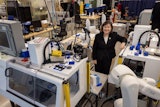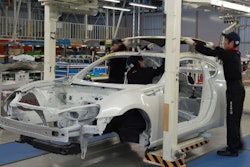Many small and midsized manufacturers sit at a tipping point. They have built successful operations and have strong customer relationships. However, they lack high-quality information about their businesses and the ability to scale. They also often struggle to attract top talent. As a result, these manufacturers will eventually hit a wall — and no amount of grit and determination will help them push through it.
Further, competition has intensified. A manufacturer’s competitors are no longer just the other companies in its region. Instead, in today’s globalized marketplace, manufacturers face challenges from all directions. These market dynamics force companies to be more innovative and nimble in responding to changing customer needs.
The Internet of Things (IoT), which is rapidly expanding in manufacturing operations, can offer solutions to these challenges. By enabling increased connectivity of industrial products, IoT can provide manufacturers with productivity-enhancing data and information about the machinery in their plants as well as the products they deliver to customers. With these insights into the physical performance of industrial products, manufacturers can improve fulfillment management and customer service over the life of a product.
However, in order to take full advantage of IoT, manufacturers need an advanced, fully-integrated technology operation that allows them to organize, process and cull insights from the significant amount of data flowing through their operations and supply chains.
Fortunately, modern, lean enterprise resource planning systems include cutting-edge business intelligence tools that allow manufacturers to process data more efficiently and perform real-time pulse checks on their businesses. And because these systems are cloud-based, it’s easy to scale up as companies add customers or new locations. These systems also provide workers with responsive and easy-to-use technology tools that mirror the advanced personal technology they use daily. This enables manufacturers to attract the talent they need to grow.
Much like mobile phones have evolved rapidly from cumbersome bricks into mini-computers, ERP systems have made great strides over the past decade, putting advanced capabilities in the hands of businesses of all sizes. In this sense, modern ERP systems can be a great leveler and allow small and midsized manufacturers to use tools that were formerly the exclusive domain of the largest manufacturers. This allows companies to continue to respond quickly to customer needs while also gathering the high-quality, real-time insights they need to grow.
However, overhauling a company’s technology footing isn’t easy. Business leaders must take a critical look at their current processes, identify inefficiencies and assertively embrace operational change driven by modern, advanced technology.
Move From Point-in-Time to Real-Time Insights
Many small and midsized manufacturers remain wedded to outdated back-office technology. But these systems, which may have been installed over a decade ago, lack the ability to provide real-time insights on business performance in an IoT-enabled operation.
For a manufacturer looking to grow, accurate and timely insights into business performance are crucial to success. Without accessible, real-time data, the company’s leaders struggle to forecast accurately and make the proper strategic decisions. This hinders their ability to address customer needs and place the organization and its products in a competitive position. With outdated systems, company leaders cannot effectively use data from IoT-enabled products and often end up looking at data filtered through different departments at the company. And these data, which are usually pulled from spreadsheets, show a limited, point-in-time view of performance. This results in the manufacturer flying blind in a hyper-competitive environment that requires accurate and detailed maps.
Today’s modern ERP systems can change this dynamic with a common data reference point that comes from real-time business intelligence. This enables various players in a firm — everyone from the CFO to the manager on the factory floor — to see the same version of the truth. And this equips executives with the information they need to make better and quicker decisions.
Embrace Cloud-Driven Interconnectivity
The cloud is here to stay, and that’s great news for upstart manufacturers. With the cloud, the total cost of technology ownership plummets. There’s no longer a need for an expensive and complex upfront installation. And manufacturers no longer need to maintain and service on-premises infrastructure with armies of contractors. The cloud also facilitates growth by allowing manufacturers to easily and quickly scale up operations as they add new locations.
Further, the cloud offers manufacturers the chance to embrace the mobility revolution, which enables constant connection between the entire company — from the manufacturing floor to finance and accounting to reps in the field to the C-suite. Employees can access crucial data — everything from production forecasting to purchasing information to product performance — anywhere, which maximizes productivity across the organization.
This easy access to real-time data and insights can also help companies attract the talented workers they need. These workers are accustomed to collaborative mobility in their personal technology use and seek to work at companies that offer the same capabilities in a business setting. In this sense, adopting the cloud is a must for manufacturers facing not only competitive pressures but also persistent workforce recruitment challenges.
Run, Don’t Walk, Toward Modern Technology
If a manufacturer is still operating off of decade-old technology, it’s time for company leaders to take a hard look at the organization’s technology footing and business processes. Chances are they will find glaring inefficiencies that are holding the company back from sustainable growth, preventing it from taking full advantage of IoT, and making it vulnerable to market encroachment by competitors.
The companies that fail to take a hard look at their technology and resist the need to adopt cutting-edge solutions will find that the potential customer base for their services starts to shrink. Unable to pivot in response to competitor challenges, these companies will become increasingly irrelevant.
But the companies that take the current market challenges seriously, perform a thorough business process analysis and fully embrace modern ERP solutions will position themselves to generate maximum business benefits from IoT, improve operational efficiency, attract a strong workforce and chart a clear course toward long-term growth and prosperity.
Greg Price is a partner in Sikich LLP’s technology practice.























